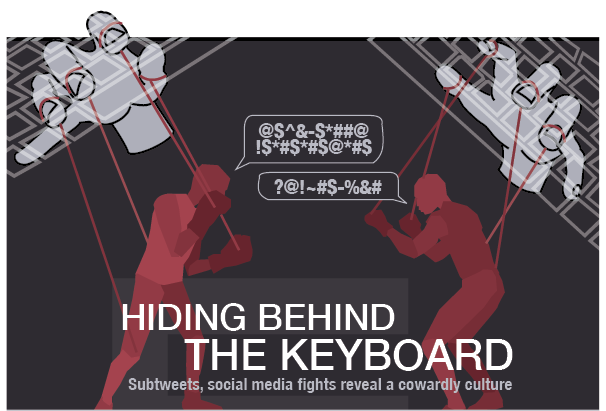Hiding Behind the Keyboard
Subtweets, social media fights reveal a cowardly culture
“Not everything is about you.”
“I dumped my ex-boyfriend months ago, and he’s still texting me. LMAO.”
“Why do I even bother?”
“You know I can tell when you’re lying to my face, right?”
Look familiar?
We’ve all been victims of this and — let’s be honest — guilty of it, too.
Subtweeting — the act of indirectly talking about a specific person or multiple people on social media without actually mentioning their username.
It can be so tempting to do it — it’s specific enough that the person who is targeted knows it’s about them but general enough that you can still get away with slinging insults.
It’s also easy to be guilty of starting direct fights on social media, especially if you’re fighting over something you’re passionate about like politics or personal issues.
A large amount of people engage in subtweeting or squabbling on social media, so what’s the big deal?
It’s cowardly and petty.
This generation of the Internet has created a culture of hiding behind technology to start conflicts or to put down others, and it’s not helping anyone.
We should be confronting subjects of dispute directly instead of projecting our problems onto Twitter or Facebook with indirect messages full of animosity.
That can look like talking to your friend about why she seems to be lying to you lately.
It can also look like having an actual, civilized conversation about what your discord is over instead of saying things on social media which you would never say to the opposing person’s face.
Or it can just be refraining from posting rude statuses or tweets which only make you look bad and, frankly, pitiful.
Your personal issues will still be there after you’ve posted — if the targeted person finds the posts, the problems might actually be worse.
You’re also not going to win the battle over politics or private matters on social media.
If you address these disagreements face-to-face, you will be more likely to have a civilized discussion that actually can arrive at a point of understanding or some kind of compromise between differing opinions.
Also, consider this — if you treat the person on the other side of the screen like an actual human, then you both will be more likely to be respectful and have a well-mannered discussion.
So the next time you’re getting really fired up about something and want to go to social media to talk about it, think carefully about what you’re saying and what it will actually accomplish.

Kaitlin Yu is co-editor in chief of “The Tiger Print.” She appreciates the arts, loves cats and dogs and takes pleasure in wasting her time away by...




